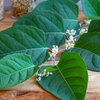Herb of the Week: Japanese Knotweed (Polygonum cuspidatum)
September 07, 2019

JAPANESE KNOTWEED AT A GLANCE
-
Other names: Hu Zhang
-
Parts used: Root, rhizome
-
Taste: Bitter
-
Energy: Cold, dry
-
Traditional and medicinal uses: Antibacterial, antifungal, antioxidant, blood stasis and damp heat cleanser
JAPANESE KNOTWEED: HEALING STEEPED IN EASTERN TRADITION
Around the world, Japanese Knotweed has almost as many names as it does uses. Hu Zhang, Japanese Knotweed, Asian knotweed, donkey rhubarb – no matter what moniker this powerful herbal ally adopts, it has become synonymous with holistic healing. Originally grown in parts of China, Japan, and Korea, this large member of the knotweed and buckwheat family polygonaceae has successfully migrated to dozens of habitats, climates and countries, bringing its antibacterial, antifungal and antioxidant properties along.
If you’re considering adding a holistic herb steeped in ancient eastern healing tradition to your wellness roster, look no further: Japanese Knotweed has you covered.
TRADITIONAL AND MEDICINAL USES
The following are a combination of perceived medicinal benefits of Japanese Knotweed based on historical information, traditional benefits and modern, scientific examples grounded in studies and research.
- Blood, Trauma & Cardiac Pain Dispeller
Japanese Knotweed is often recognized for its beneficial impact on the cardiovascular system. In traditional eastern medicine, Japanese Knotweed is often used to regulate blood flow, combat blood stasis, and reduce pain caused or exacerbated by poor blood circulation. Historically, it has also been used to treat arthralgias and trauma injuries associated with blood loss.
- Arthritis & Arthralgia Pain Dispeller
Because of its historical use in the inhibition of arthritis, Japanese Knotweed is sometimes relied on in the treatment of autoimmune diseases and chronic illnesses that cause joint pain and inflammation. Those suffering from rheumatoid arthritis, chronic Lyme disease and other illnesses that impact the joints should consider incorporating Japanese Knotweed into their wellness regimen. This is especially true for those with Lyme disease, as the herb has antibacterial properties as well, which may simultaneously treat Lyme-related bacteria.
- Damp/Heat (Antibacterial) Clearer
Japanese Knotweed has been used as a traditional bowel cleanser for centuries. Many swear by its ability to clear damp/heat in the intestines, bowels, genitourinary and gastrointestinal tracts. In addition to these properties, Japanese Knotweed is also known to address menstrual pain, dysentery and urinary tract irritation, and can be combined with other heat clearing herbs to improve its efficacy. This herbal ally is also thought to clear heat in the lungs, treating respiratory and pulmonary conditions such as bronchitis, pneumonia, tonsillitis and more.
When turned into a syrup, as is often done in China, Japanese Knotweed has been believed by some to address complications caused by gastric cancer. When combined with other herbal allies, Japanese Knotweed may be able to reduce leukopenia caused by radiotherapy, and some believe it can be used to inhibit tumor development and growth.[1] For those undergoing chemotherapy or other radiation treatment, it is possible that Japanese Knotweed may be a helpful addition to treatment. Remember, however, to always consult your physician prior to using an herbal ally as a supplement to a serious condition such as cancer.
Japanese Knotweed can be applied topically, too! The herb is often used to treat a host of skin conditions, including first- and second-degree burns, abscesses, boils, candida, thrush, trauma injuries and more. It may also possess properties needed to treat chronic or pervasive conditions, such as psoriasis and shingles.
HERBAL COMBINATIONS
Consult the herbal combinations below to learn which herbal allies can enhance the efficacy of Japanese Knotweed and provide additional benefits that contribute to a natural, holistic, health-oriented lifestyle.
- Damp/Heat Clearing Combinations
Combining Japanese Knotweed with Lonicera, Usnea and Elecampane can amplify its powers as an expectorant and help clear damp/heat in the lungs and other parts of the respiratory system.
CONTRAINDICATIONS AND DRUG INTERACTIONS
- EXCESS Can Cause Diarrhea And Nausea
- Can Exacerbate Calcium Oxylate Stones
No matter its benefits, always be sure to consider any possible contraindications or drug interactions caused by an herbal ally. Japanese Knotweed is relatively safe and does not have many contraindications or drug interactions. However, taken in excess, it has been known to cause diarrhea and nausea, and for those who suffer from calcium oxylate stones, it can cause additional calcium oxylate buildup. Always consult a doctor or physician before introducing a new herb into your wellness regimen.
WHAT’S NEXT?
Learn more about Japanese Knotweed: find suggested doses, wildcrafting suggestions and more here
Purchase Japanese Knotweed here
Book a one-on-one consultation here to learn more about incorporating herbal allies like these into your wellness regimen.
[1] (Feng, et. al, 2006)




